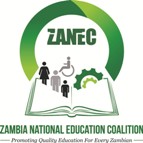
1.0 BACKGROUND
The Zambia National Education Coalition (ZANEC)’s core mandate is to conduct evidence-based advocacy for quality education for all Zambians. The niche of the Coalition is thus to conduct research, analysis, monitoring and influencing policy direction in the education and skills sector. In addition, ZANEC is known for mobilising Civil Society Organisations and communities through its Member Organisations located in various parts of the country, giving the Coalition its national character.
ZANEC envisions a “sustainable and inclusive education system that responds to national aspirations and fosters an environment of self-fulfilment”. Implementation of this vision needs different stakeholders including government, cooperating partners, non-governmental organizations, trade unions and student movements. As such, ZANEC, with support from Norwegian Student’s and Academics’ International Assistance Fund (SAIH) has been advocating for access to quality education service delivery in Institutions of Higher Learning.
2.0 RATIONALE OF THE STUDY
The Higher Education Loans and Scholarships Act of 2016 provides for equitable access to tertiary education through the administration, investment, payment and recovery of loans. It also provides for the administration and granting of scholarships as well as facilitating the mobilization of financial resources for loans and scholarships. The Loans and Scholarship Scheme allows for the equitable and equal access to higher education through the provision of financing to qualifying Zambians.
It is against this background that ZANEC seeks to commission a study to assess the impact of the implementation of the Loans and Scholarship Scheme in Institutions of Higher Learning. In 2019, the Coalition conducted a study to look at access to the loans and scholarships. This study is intended to build on the previous study by assessing the impact of the loans and scholarships awarded by the Higher Education Loans and Scholarship Board (HELSB). It is expected that the study will look into the financing trends, accessibility by gender and geographical location, relevance, efficiency, effectiveness, sustainability and impact or value for money. The assessment is intended to generate evidence that will be used to inform ZANEC’s advocacy work.
2.1 Objectives of the study
- To assess the progress achieved by HELSB in the administration of loans and scholarships using the five (5) evaluation criteria namely relevance, effectiveness, efficiency, impact (value for money) and sustainability.
- To document the key lessons and make practical recommendations that will inform advocacy for increased financial support and equitable access to higher education for disadvantaged and marginalized students including those at risk of dropping out due to non-availability of funds, through the Loans and Scholarships Scheme.
3.0 SCOPE OF WORK
- The scope of work should follow a transparent and inclusive process of consultation of the diverse groups that make up the Education and Skills Sector.
- To conduct an analysis of the loans and scholarship administration process including the advertisement, application and rewarding process.
- Assess the responsiveness of the delivery mechanism to the needs of the beneficiaries
- Investigate how many Institutions of Higher Learning are benefitting from the loans and scholarship scheme and the impact of the support on student enrolments. Assess the impact of the withdrawal of meal allowances from the scholarship package and the ramifications of this decision.
- To assess how the loan scheme has responded to the advent of COVID 19 pandemic and its resultant economic challenges at household and national level.
- To assess how much has been made in recoveries, including the performance of the private and public sector in ensuring beneficiaries pay back their Loans and how it has been reinvested into the scheme.
- Conduct an analysis of the Skills Development Fund and how it contributes towards the provision of the Loans and Scholarship Scheme.
4.0 DELIVERABLES AND DURATION OF CONSULTANCY
The assignment is expected to be completed within 11 working days and timeframes are to be jointly agreed between ZANEC Secretariat and the consultant, with the following deliverables.
- Inception report with proposed data collection methodologies and proposed time frames for deliverables.
- First and second draft of the research report for review.
- Summary power point presentation of the findings of the impact assessment. Present the second draft impact assessment report at a stakeholders’ meeting.
- Final research report incorporating all the comments by stakeholders.
5.0 REQUIRED COMPETENCIES
- Must have at least a Master’s Degree in Education or related field.
- Proven experience and track record in policy analysis and research.
- Strong communication skills for both oral and written English.
- Ability to devote full time to the assignment and meet deadlines.
PLEASE SUBMIT YOUR APPLICATIONS BY FRIDAY, 25th JUNE 2021 TO:
The Executive Director
Zambia National Education Coalition (ZANEC)
Baptist Fellowship Building
Conner of Makishi and Great East Road,
Plot 3061/2
Lusaka, Zambia
Telephone number +26011226422
Or e-mail: admin@zanec.org.zm
Find Us on Social Media
